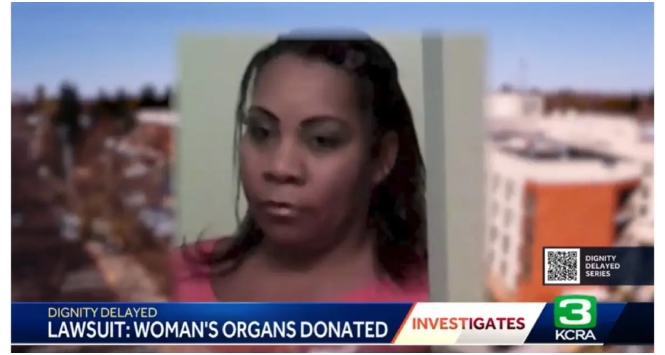The family of a 51-year-old woman who died at a Dignity Health hospital has filed a civil lawsuit alleging that her organs and tissue were harvested without legal consent, and her remains were stored improperly for months while her family searched for her as a missing person.
The complaint, filed this week in Sacramento County Superior Court, names Dignity Health and its contracted morgue provider, Mortuary Support Services of Northern California, as defendants.
The suit alleges multiple violations of California health and safety codes, including failure to notify next of kin, delay in issuing a legally required death certificate, unauthorized organ and tissue removal, and negligent storage of human remains.
Allegations of Unauthorized Organ Harvesting
According to the complaint, Tonya Walker died on November 2, 2023, at Mercy General Hospital, a Dignity Health facility in Sacramento. Despite California law requiring hospitals to notify the next of kin and issue a death certificate within eight days, the family alleges they were never informed of her death and were forced to initiate a missing persons investigation.
The death certificate, according to court filings, was not issued until nearly five months later, in direct violation of state regulations.
Once located, Walker’s body was found at an off-site facility operated by Mortuary Support Services, also known publicly as Cremations Only. Her family claims that her eyes and skin had been surgically removed, even though Walker was not an organ donor, nor had her family provided any consent.
“Dignity unilaterally made the decision to make Ms. Walker an organ donor,” the lawsuit states, “and then, without any permission whatsoever, harvested Ms. Walker’s eyes and tissue.”
Improper Storage and Morgue Conditions
The lawsuit also accuses Mortuary Support Services, owned by Michael Robert Lofton, of violating state law by storing Walker’s body for over five months without the legally required permit and without proper refrigeration or embalming procedures.
State law mandates that a permit be obtained if a body is stored for longer than eight days. The complaint asserts that the morgue’s facility failed to meet the minimum standards for human remains storage as outlined by California Department of Public Health (CDPH) guidelines.
In a statement issued through legal counsel, the company denied liability:
“This is a very unfortunate situation; however, our client, Mortuary Support Services of Northern California, disputes that it has any liability in this matter and intends to vigorously defend any claims against it.”
Pattern of Delayed Death Certificates and State Oversight Failures
This is at least the third lawsuit brought against Dignity Health in recent months concerning mishandling of postmortem procedures and death notifications. Reporting by KCRA 3 Investigates previously revealed that dozens of bodies were kept in backlog by the hospital system without family notification or timely death certificates. In some cases, remains were stored for over a year at the off-site morgue.
While state health regulators have previously cited Mercy General and other Dignity facilities—including Mercy San Juan Medical Center—for similar deficiencies, no enforcement action has been taken. A 2024 inspection by CDPH revealed that the hospital failed to notify families of deaths, delayed death certificates, and lacked documentation about where bodies were transferred—leading to emotional distress among relatives who could not locate deceased loved ones.
“These small acts—following the law, notifying the family, and issuing a timely death certificate—could have prevented this grief,” said Rachel Fiset, the Walker family’s attorney. “This case represents a serious breakdown in patient rights and healthcare accountability.”
DA’s Office and CDPH Under Scrutiny
The lawsuit also alleges that the Sacramento County District Attorney’s Office is now investigating. While the DA’s office declined to confirm or deny any active investigation, the claim marks a potential escalation in governmental scrutiny over Dignity Health’s mortuary practices.
The CDPH, which oversees hospital licensing and standards, has yet to take formal disciplinary action despite citing similar violations dating back to at least 2022.
According to internal reports reviewed by KCRA, in one case, a patient’s family was not notified for six weeks. In another, a son was left in emotional limbo after hospital staff failed to document where his mother’s body was transferred.
Although Dignity Health submitted corrective action plans following each violation, CDPH revisit surveys later declared the hospitals “in compliance,” despite continued lapses. CDPH Director Dr. Erica Pan has repeatedly declined to comment on the issue or sit for an interview with the press.
Legal Implications
Legal analysts say the case could open the door for further litigation, especially if it’s revealed that the alleged organ donation practices were systemic.
“If consent for organ donation was bypassed, that’s a serious violation not only of state law but of constitutional protections around bodily autonomy,” said a California-based medical law expert who is not affiliated with the case.
The Walker family is seeking unspecified compensatory and punitive damages, along with declaratory relief requiring Dignity Health and its morgue contractors to comply with California health statutes and obtain consent before any postmortem organ or tissue procedures.
As of this report, Dignity Health has not issued a public statement in response to the lawsuit.

